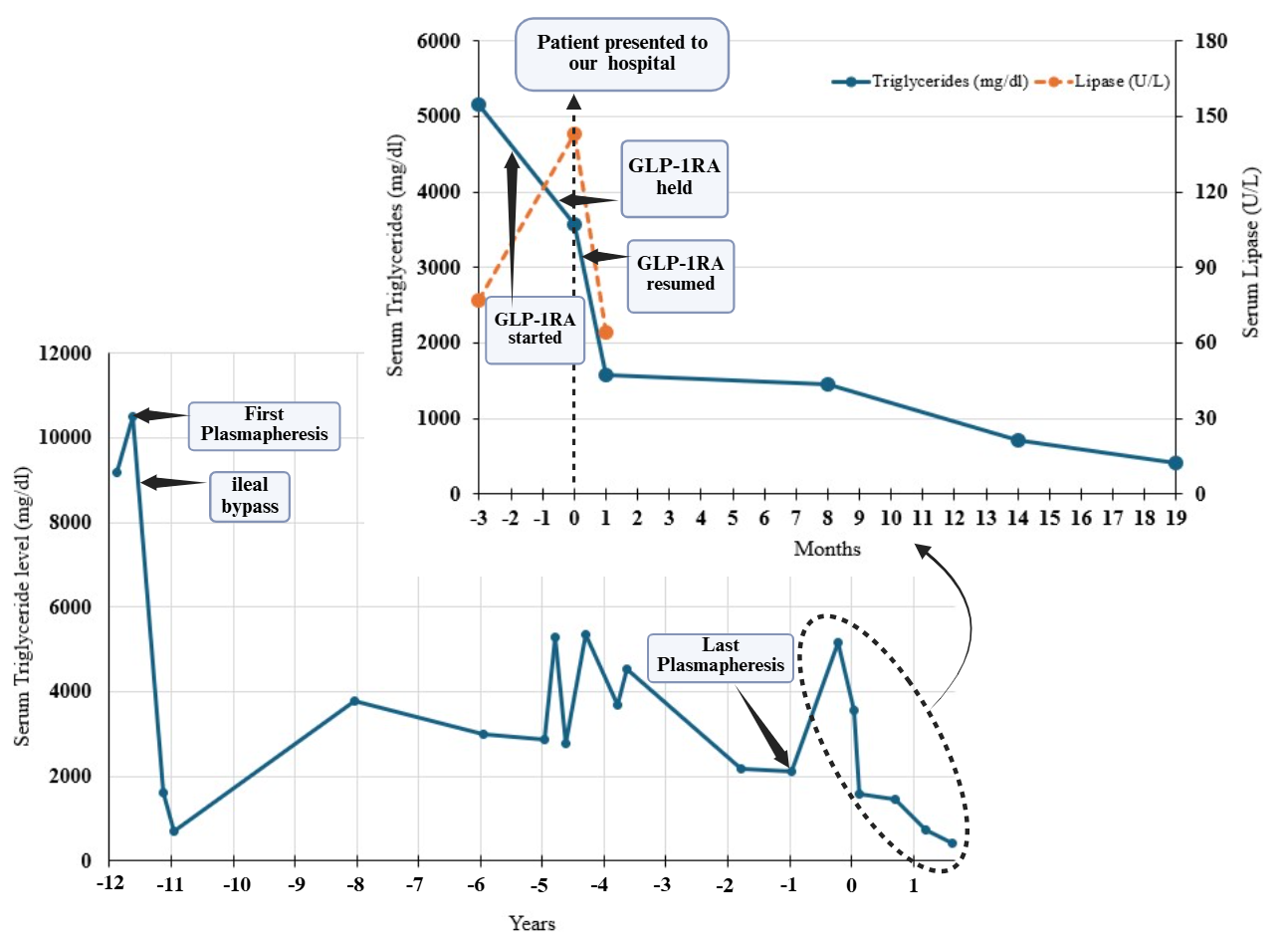Tuesday Poster Session
Category: Biliary/Pancreas
P4518 - Successful Use of GLP-1 Receptor Agonist in Patient With Recurrent Hypertriglyceridemia-Induced Pancreatitis: A Case Report
Tuesday, October 28, 2025
10:30 AM - 4:00 PM PDT
Location: Exhibit Hall

Chinmay Guralwar, MBBS (he/him/his)
Mayo Clinic
Rochester, MN
Presenting Author(s)
Award: ACG Presidential Poster Award
Chinmay Guralwar, MBBS, Shuji Mitsuhashi, MBBS, Motaz Ashkar, MBBS, MS, Victor Chedid, MD, MSc
Mayo Clinic, Rochester, MN
Introduction: GLP-1 receptor agonists (GLP-1RAs) primarily used for Type 2 diabetes and weight management, are generally avoided in patients with history of pancreatitis due to concerns about an increased risk of acute pancreatitis (AP). This case report highlights their successful use in a patient with recurrent hypertriglyceridemia-induced AP (HTG-AP), challenging current practices.
Case Description/
Methods: A 42-year-old female with obesity (BMI 34 kg/m2), heterozygous for lipoprotein lipase gene variant (c.710G >A; p.Gly237Asp), and a 22-year history of recurrent HTG-AP presented with acute epigastric pain. Labs showed elevated lipase (143 U/L; upper normal limit 60 U/L) and triglycerides (TG) (3,565 mg/dL). CT imaging demonstrated acute necrotizing pancreatitis changes. Her history included >25 hospitalizations for HTG-AP, with persistently elevated TG (up to 10,500 mg/dL) despite aggressive interventions, including maximum-dose lipid-lowering agents (gemfibrozil, orlistat, pravastatin), ileal bypass, and plasmapheresis.
Two months prior, she started liraglutide therapy (0.6 mg/day), which significantly improved symptoms and prevented HTG-AP recurrence. However, insurance issues led to a seven-day discontinuation before this admission, which she strongly believed contributed to her current AP episode. During her hospitalization, she was managed conservatively and discharged after three days. After a thorough discussion of risks and benefits, liraglutide therapy was resumed in the outpatient setting. On her most recent outpatient follow-up, 19 months since her last hospitalization, she has remained asymptomatic without AP recurrence, achieved 15% weight loss, and her TG level declined to 404 mg/dL. She continues GLP1-RA therapy with regular outpatient follow-up.
Discussion: To our knowledge, this is the first documented case demonstrating long-term efficacy of GLP-1RA in a patient with recurrent HTG-AP. Decision making to initiate GLP-1RA therapy was achieved by weighing the potential benefits of weight reduction and improvement in TG levels against the theoretical risks of pancreatitis. Remarkably, the patient’s most recent TG level of approximately 400 mg/dL represents the lowest value recorded in over a decade (Figure 1), indicating a clinically significant and sustained TG-lowering effect. This favorable response highlights the importance of individualized, patient-centered care and challenges conventional contraindications.

Figure: Figure 1: Trend of serum triglyceride and lipase levels over time
Disclosures:
Chinmay Guralwar indicated no relevant financial relationships.
Shuji Mitsuhashi indicated no relevant financial relationships.
Motaz Ashkar indicated no relevant financial relationships.
Victor Chedid: Pfizer – Grant/Research Support. Takeda – Consultant.
Chinmay Guralwar, MBBS, Shuji Mitsuhashi, MBBS, Motaz Ashkar, MBBS, MS, Victor Chedid, MD, MSc. P4518 - Successful Use of GLP-1 Receptor Agonist in Patient With Recurrent Hypertriglyceridemia-Induced Pancreatitis: A Case Report, ACG 2025 Annual Scientific Meeting Abstracts. Phoenix, AZ: American College of Gastroenterology.
Chinmay Guralwar, MBBS, Shuji Mitsuhashi, MBBS, Motaz Ashkar, MBBS, MS, Victor Chedid, MD, MSc
Mayo Clinic, Rochester, MN
Introduction: GLP-1 receptor agonists (GLP-1RAs) primarily used for Type 2 diabetes and weight management, are generally avoided in patients with history of pancreatitis due to concerns about an increased risk of acute pancreatitis (AP). This case report highlights their successful use in a patient with recurrent hypertriglyceridemia-induced AP (HTG-AP), challenging current practices.
Case Description/
Methods: A 42-year-old female with obesity (BMI 34 kg/m2), heterozygous for lipoprotein lipase gene variant (c.710G >A; p.Gly237Asp), and a 22-year history of recurrent HTG-AP presented with acute epigastric pain. Labs showed elevated lipase (143 U/L; upper normal limit 60 U/L) and triglycerides (TG) (3,565 mg/dL). CT imaging demonstrated acute necrotizing pancreatitis changes. Her history included >25 hospitalizations for HTG-AP, with persistently elevated TG (up to 10,500 mg/dL) despite aggressive interventions, including maximum-dose lipid-lowering agents (gemfibrozil, orlistat, pravastatin), ileal bypass, and plasmapheresis.
Two months prior, she started liraglutide therapy (0.6 mg/day), which significantly improved symptoms and prevented HTG-AP recurrence. However, insurance issues led to a seven-day discontinuation before this admission, which she strongly believed contributed to her current AP episode. During her hospitalization, she was managed conservatively and discharged after three days. After a thorough discussion of risks and benefits, liraglutide therapy was resumed in the outpatient setting. On her most recent outpatient follow-up, 19 months since her last hospitalization, she has remained asymptomatic without AP recurrence, achieved 15% weight loss, and her TG level declined to 404 mg/dL. She continues GLP1-RA therapy with regular outpatient follow-up.
Discussion: To our knowledge, this is the first documented case demonstrating long-term efficacy of GLP-1RA in a patient with recurrent HTG-AP. Decision making to initiate GLP-1RA therapy was achieved by weighing the potential benefits of weight reduction and improvement in TG levels against the theoretical risks of pancreatitis. Remarkably, the patient’s most recent TG level of approximately 400 mg/dL represents the lowest value recorded in over a decade (Figure 1), indicating a clinically significant and sustained TG-lowering effect. This favorable response highlights the importance of individualized, patient-centered care and challenges conventional contraindications.

Figure: Figure 1: Trend of serum triglyceride and lipase levels over time
Disclosures:
Chinmay Guralwar indicated no relevant financial relationships.
Shuji Mitsuhashi indicated no relevant financial relationships.
Motaz Ashkar indicated no relevant financial relationships.
Victor Chedid: Pfizer – Grant/Research Support. Takeda – Consultant.
Chinmay Guralwar, MBBS, Shuji Mitsuhashi, MBBS, Motaz Ashkar, MBBS, MS, Victor Chedid, MD, MSc. P4518 - Successful Use of GLP-1 Receptor Agonist in Patient With Recurrent Hypertriglyceridemia-Induced Pancreatitis: A Case Report, ACG 2025 Annual Scientific Meeting Abstracts. Phoenix, AZ: American College of Gastroenterology.


